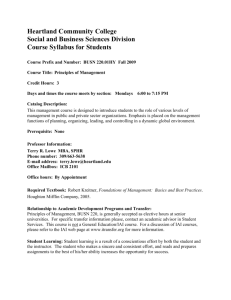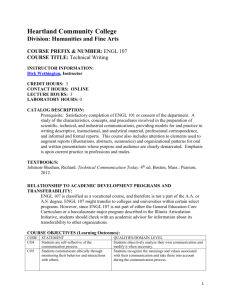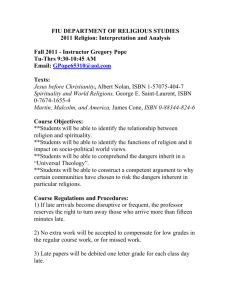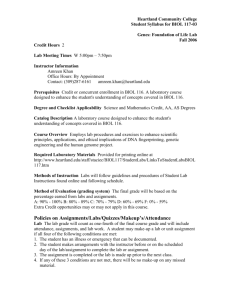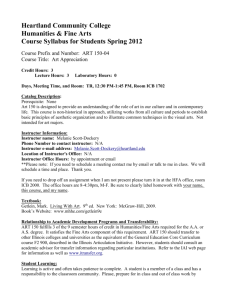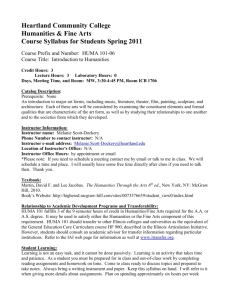HIST135 91 CARROLL SP 11
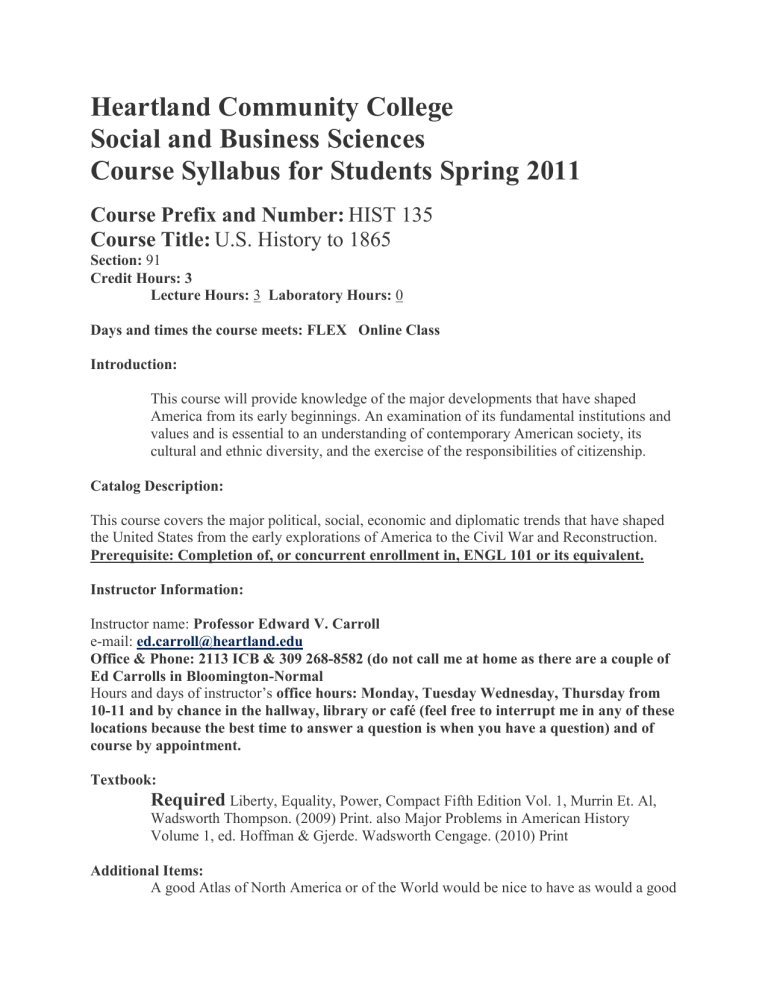
Heartland Community College
Social and Business Sciences
Course Syllabus for Students Spring 2011
Course Prefix and Number:
HIST 135
Course Title:
U.S. History to 1865
Section: 91
Credit Hours: 3
Lecture Hours: 3 Laboratory Hours: 0
Days and times the course meets: FLEX Online Class
Introduction:
This course will provide knowledge of the major developments that have shaped
America from its early beginnings.
An examination of its fundamental institutions and values and is essential to an understanding of contemporary American society, its cultural and ethnic diversity, and the exercise of the responsibilities of citizenship.
Catalog Description:
This course covers the major political, social, economic and diplomatic trends that have shaped the United States from the early explorations of America to the Civil War and Reconstruction.
Prerequisite: Completion of, or concurrent enrollment in, ENGL 101 or its equivalent.
Instructor Information:
Instructor name: Professor Edward V. Carroll e-mail: ed.carroll@heartland.edu
Office & Phone: 2113 ICB & 309 268-8582 (do not call me at home as there are a couple of
Ed Carrolls in Bloomington-Normal
Hours and days of instructor’s office hours: Monday, Tuesday Wednesday, Thursday from
10-11 and by chance in the hallway, library or café (feel free to interrupt me in any of these locations because the best time to answer a question is when you have a question) and of course by appointment.
Textbook:
Required
Liberty, Equality, Power, Compact Fifth Edition Vol
. 1, Murrin Et. Al,
Wadsworth Thompson. (2009) Print. also
Major Problems in American History
Volume 1 , ed. Hoffman & Gjerde. Wadsworth Cengage. (2010) Print
Additional Items:
A good Atlas of North America or of the World would be nice to have as would a good
dictionary. When using on-line dictionaries please use Webster’s Dictionary or the
Oxford English Dictionary which is an etymological dictionary and provides a history of the word, so if you are reading old documents it is worth using this dictionary to understand what a particular word meant in the 1500’s, the 1600’s the 1700s and finally in the 1800s.
Relationship to Academic Development Programs and Transfer:
(Indicate if course is General Education/IAI)
This course fulfills 3 of the 9 semester hours of credit in Social Sciences required for the A.A. or
A.S. degree. This course should transfer as part of the General Education Core Curriculum described in the Illinois Articulation Initiative to other Illinois colleges and universities participating in the IAI. However, students should consult with an academic advisor for transfer information regarding particular institutions. Refer to the IAI web page at www.itransfer.org for more information.
COURSE OBJECTIVES (Learning Outcomes):
Learning Outcome
Distinguish between primary and secondary sources as the foundation of modern historical scholarship from 1400 to 1865.
GE
Code
PS1
Interpret primary sources critically by analyzing their historical contexts.
CT3
Formulate historical interpretations, both in discussion and in writing, and defend them critically with reference to primary and secondary sources.
Incorporate into historical interpretations, both in discussion and in writing, an understanding of historical causation reflecting a) knowledge of important figures and events and their chronological relationship to each other and b) an awareness of the contingent relationships.
CO4
CT3
Method of Assessment
Two assignments will be used to assess student learning. One in the form of settlers’ needs, the other in the form of a puzzle regarding railroads.
Using quizzes, short papers, group project or perhaps other methods to assess student learning.
These will be assessed using short paper, group project and oral report.
These will be assessed using short papers, the research paper, group project and/or oral reports.
Acquire at one and the same time a comprehension of diverse cultures and shared humanity, as evidenced both orally and in writing.
DI3 These will be assessed using papers, group project, oral report, or through the book review.
TOPIC OUTLINE FOR THE COURSE:
The following topics are to be covered during the instructional process:
1.
Discovery and Early Exploration
2.
English Colonization and Colonial Society
3.
The American Revolution
4.
Confederation and Constitution
5.
The Federalist Era
6.
Jefferson and the War of 1812
7.
Jacksonian Democracy
8.
Manifest Destiny and the Mexican War
9.
Antebellum Society and Culture
10.
Slavery and Sectional Conflict
11.
The Civil War
Course Policies:
Method of Evaluation (Tests/Exams, Grading System):
All graded discussion items = 250 points
All graded written assignments = 250 points
All journal writing = 200 points
Mid-Term Exam = 100 points
Final Exam = 100 points
Attendance/Logins = 100 points
Total Available = 1000 points
1000 Points total: 90% 900-1000=A
80% 800-899=B
70% 700-799=C
60% 600-699=D
Below 60% = F
Attendance
Students are expected to login and participate meaningfully in the activities during each week for about 3 hours or more. I expect to tally at least 4 logins during the week to count towards the
100 points of attendance. Attendance will be taken at the end of every module. Outstanding attendance as well as participation will impact the determination of borderline final grades.
Failure to attend can result in a withdrawal from the class.
Participation Grade:
Your participation is expected in every class meeting, but will be reflected in these graded items:
1. Your attendance in class; 2. Your participation in discussions of primary and/or secondary source assignments; 3. Your contribution to the class as measured by your commentary on class mates discussion postings and your skill in the other discussion assignments.
Required Writing and Reading:
This course requires approximately 30-40 pages of reading per week or 500 per semester.
Reading assignments will include both primary and secondary source materials. A minimum of
15 pages of college level writing is required in this course. Writing assignments include papers of various lengths, essay exams and various projects as deemed appropriate by the instructor.
Incompletes:
Read your student handbook before you ask for an (I) incomplete grade for this class.
Incompletes may be granted only when justified by extreme circumstances.
Extra-Credit: Extra credit is anticipated for this class based on public history events or sudden
ideas that come up in class discussion.
Class Environment:
We are all adults in this class so the discussion of a wide variety of topics is expected. This will include religion, sex and various political, ethnic, racial and cultural developments. In discussion please treat everyone with dignity especially during the discussion of subjects related to significant divergence of opinions. Differences of opinion in this class are welcome. Rude or degrading comments do not add to the learning experience in any classroom. Hurt feelings hurt student learning. Humor is always welcome since the classroom and the material allow for wordplay and humorous comments. History affords all of us amusing material and the pompous buffoonery of many people in the past is as funny as today’s buffoons, idiots and public figures.
Aid
Aid with reading or writing for this class is handled systematically on two paths; first email me and I will help you understand a concept or discuss your writing problems and eventually if you need further writing or study help I will send you to the Writing Center and to the Tutoring
Center; second instead of calling on me you could go to the Tutoring Center and the Writing
Center on your own. I have known only one student who never needed any help with reading, writing or math; he was a genius who developed something interesting while a graduate assistant at UIUC at age twenty. He took the idea for this item to a group at MIT and Kodak; apparently it is still a classified patent. It was a very important development in some branch of computing, and then he retired at age 25. So please remember, there are no bad questions; often great developments come from what seem to be bad questions, because formulating answers to any question or questions can reveal new ways to look at an event or to teach about the event.
Make-up of Tests Assignments :
Make-ups will be given only if the student has a documented case of influenza or other potentially dangerous disease. A hang-over is not an excuse, save the drinking for Friday &
Saturday nights. This is an on-line class so there should be not trouble with arranging times to take the Mid-Term Exam and the Final Exams, I will make the Mid-Term open for at least15 days and the Final for 21 days. You will get an announcement and an email to let you know the day it opens and the length of time until the due date. Both Exams will be taken in the Testing
Center. You must follow their rules which include having a photo ID, knowing the name of your instructor and the designation of the course. So bring your ID and remember that this is for Ed
Carroll’s HISTORY 135-91. You are invited to type the exam and use spellcheck. You will have the Four topics for at least a month before the exam and you will have two hours maximum to write the exam, but most people finish writing in 35-50 minutes.
Deadlines
Late assignments will be docked points for every day they are late. No exceptions. I will provide some specific instructions for some primary source papers and the group projects.
Specifications for written materials:
While the following statement is for use in the classroom version of this course, however it does apply to the primary and secondary sources short essay answers that reach 4-8 paragraphs. It is important for me and for your classmates to be able to know through citations which sources you are using to support you views. Written materials will be formatted in the most recent edition of
MLA format as taught in English 101 and 102 classes. The Chicago style is also acceptable system of format and citation style. Most historians use the Chicago style, as you will see when reading journal articles. The APA style is sometimes also taught in English 101 or 102. Note that
APA is not acceptable for any reason or excuse and any papers submitted using APA would be returned ungraded to the student. No exceptions. All citations must be in proper form and count for a total of 50 points in the primary & secondary sources work.
Any plagiarism will result in a zero for the course. If you have any doubts about what constitutes plagiarism please read the section further along in this syllabus. If after reading the statement on plagiarism, if you still have doubts please see me or go to the Writing Center in the HCC
Library.
Student Course Evaluations
During the last weeks of class, all students are encouraged to complete a course evaluation form by going online to the link that will appear in the list of Modules on the left side of these pages.
Additional reminders about evaluations will be provided, if I remember it.
HCC Portal
You should already know about the portal login at https://my.heartland.edu
if you do not understand how this works please go to the Open Computing Lab inside the HCC Library.
Papers or Writing Assignments:
The short essays will be 3-4 paragraphs, the longer sources essays will be from
6 to 8 paragraphs with proper citations attached to the essay. Additional information will be provided specific to each primary and secondary writing assignments. Appropriate outside sources must be used and cited in the same manner as those assigned from the Problems book. Wikipedia is NOT an acceptable source!
Wikipedia is not governed by any scholarly body and seeks consensus not truth. Truth by consensus is only collective opinion and is sometimes a demonstration of collective stupidity or willful ignorance. With that said Wikipedia can be a starting point and can provide reliable sources at the end of an entry, but it is not a source in itself.
Syllabi Disclaimer:
The professor may make changes to this syllabus and this Course Calendar at any time for reasons known only to the professor. Changes generally favor students by reducing the number of some required graded items of the class.
Students will be notified with an announcement and an email should changes become necessary.
Academic Integrity
Academic integrity is a fundamental principle of collegial life at Heartland Community College and is essential to the credibility of the College’s educational programs. Moreover, because grading may be competitive, students who misrepresent their academic work violate the right of their fellow students. The College, therefore, views any act of academic dishonesty as a serious offense requiring disciplinary measures, including course failure, suspension, and even expulsion from the College. In addition, an act of academic dishonesty may have unforeseen effects far beyond any officially imposed penalties.
Violations of academic integrity include, but are not limited to cheating, aiding or suborning cheating or other acts of academic dishonesty, plagiarism, misrepresentation of data, falsification of academic records or documents and unauthorized access to computerized academic or administrative records or systems. Definitions of these violations may be found in the college catalog.
Plagiarism
Plagiarism is the presenting of others’ ideas as if they were your own. When you write a paper, create a project, do a presentation or create anything original, it is assumed that all the work, except for that which is attributed to another author or creator, is your own. Plagiarism is considered a serious academic offense and may take the following forms:
1. Copying word-for-word from another source and not giving that source credit.
2 Paraphrasing the work of another and not giving that source credit.
3 Adopting a particularly apt phrase as your own.
4 Using an image or a copy of an image without crediting its source.
5 Paraphrasing someone else’s line of thinking in the development of a topic as if it were your own.
6 Receiving excessive help from a friend or elsewhere, or using another project as if it were
your own.
Note that word-for-word copying is not the only form of plagiarism.
[ Adapted from the Modern Language Association’s MLA Handbook for Writers of Research Papers. New York:
MLA, 1995: 26]
Now that you have read the Plagiarism definitions above you have been told. Therefore do
not claim you did not know. When you have doubts ask me or see someone in the Writing
Center or in the Tutoring office before you submit your essays.
Support Services:
Academic Support Services (Academic Support Center) (Tutoring & Testing) (Disability
Services) (Open Computing Lab) see any one or more of these in the A-Z listings or consult the Course Catalog or Student Handbook.
I will try to insert new information as the reorganization of the ASC continues.
Course Calendar
Is located below the calendar is also located in the Announcements.
Notice of Cancelled Class Sessions
Cancelled class sessions, for all HCC classes, will be listed under Cancelled Class Meetings on the home page after you login to
my heartland .
ECARROLL COURSE CALENDAR SPRING 2011
WEEK BEGINNING
1 1/10
2 1/17
3 1/24
4 1/31
5 2/7
6 2/14
7 2/21
8 2/28
9 3/7
10 3/14
11 3/21
12 3/28
13 4/4
14 4/11
15 4/18
16 4/25
17 5/2
18 5/11
MODULE
ORIENTATION
MODULE ONE
MODULE TWO
MODULE TWO
MODULE THREE
MODULE THREE
MODULE FOUR
MODULE FIVE
MODULE FIVE
MODULE SIX
MODULE SIX
MODULE SEVEN
MODULE SEVEN
MODULE EIGHT
MODULE
EIGHT & MODULE NINE
MODULE NINE
MODULE TEN
FINAL EXAM ENDS
DUE DATES
1/17
1/24
1/30
2/7
MIDTERM EXAM TOPICS POSTED 2/3
MIDTERM EXAM OPEN 5/9 AT 9:00 AM
MIDTERM EXAM CLOSE 2/20 5:00 PM
FINAL EXAM TOPICS 11/11
FINAL EXAM OPEN 11/18 AT 9:00 AM
FINAL EXAM OPEN
FINAL EXAM ENDS May 11 3:00 PM
ENDS at 3:00 PM

